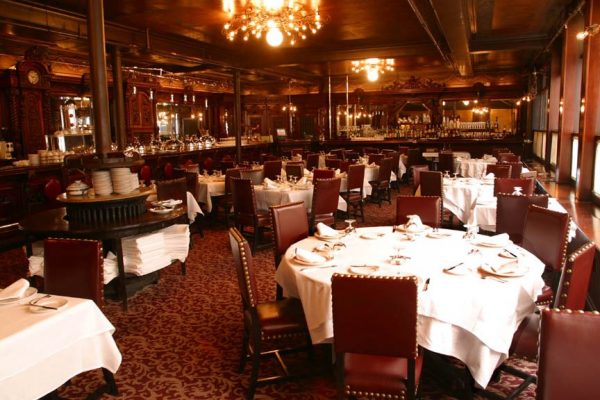Jay Hajj on His Plans for Locke-Ober
 The storied dining room at Locke-Ober. Photo courtesy of Locke-Ober/Facebook
The storied dining room at Locke-Ober. Photo courtesy of Locke-Ober/Facebook
Unless you live under a rock, you’ve heard about the closure over the weekend of the historic Downtown Crossing restaurant Locke-Ober, known for its old-school fare like lobster Savannah, enforced dress code, and patronage from the likes of John F. Kennedy back in the day. The loss of the restaurant is a loss of a piece of Boston history, to be sure, but its closure is also a cautionary tale about what happens when a restaurant refuses to adapt to modern demands for a casual, approachable atmosphere and prices to match. As The Globe’s Devra First points out in her two and-a-half star review today of the recent overhauled Oak Long Bar + Kitchen (formerly the also-historic Oak Room):
However much we love the idea of history preserved, it doesn’t mean we want to eat it. And when there is an opportunity to turn prime real estate to more-lucrative ends, it is hard to fault anyone for seizing it.
On Monday, Patrick Maguire of the blog Server Not Servant (who works at Downtown Crossing’s jm Curley) posted the following on his Facebook page:
Great news. I just got off the phone with my friend, @Jay Hajj, owner of Mike’s City Diner in the South End. Jay and two partners have signed an agreement to buy the venerable ‘Locke-Ober’ building on Winter Place in Downtown Boston. The sale includes the restaurant and its liquor license. Contrary to rumors that the treasured space would be gutted, the new owners fully intend to respect and preserve the rich, historic features and integrity of the first floor, and eventually open a new bar and restaurant in that space.
If destroyed, we could not replace the architecture and woodwork in that building. It is part of our Boston heritage and fabric.
As first reported by Brian McGrory of the Boston Globe, Jay confirmed that the Locke-Ober name and concept will be retired. The new owners are starting with a clean slate, and plan to work diligently with their local and national networks of chefs and restaurateurs to find the perfect fit for the iconic landmark. They are committed to opening an exciting, viable, sustainable restaurant that will coincide with the revitalization of Downtown Crossing.
In the wake of that news, we called up Hajj to chat about his decision to purchase the building. Hajj says he learned of the building’s availability as a real estate deal three months ago—and it’s worth noting that it was presented as a “real estate” deal rather than a “restaurant” deal, meaning that Hajj (or any other potential owner) had zero obligation to keep a restaurant in the building. Luckily, though, Locke-Ober was a selling point for Hajj. “The beauty of [the building], and why it caught my attention is because of the restaurant,” Hajj told me. “If it wasn’t for the restaurant, we would have overlooked it.”
Despite Hajj’s determination to preserve the space, he was surprised by the outpouring of public disappointment when the news broke of Locke-Ober’s closure. “I thought I was one of the few that loved the space, I really did,” Hajj says. “I am happy about [the response], and I am nervous about it, and I feel a certain responsibility. I am glad about the response, believe me. A lot of the younger people who are the majority of those dining out, if you ask them about Locke-Ober, a lot of people have never heard of Locke-Ober. Those 50 or 60+, they all know Locke-Ober. So I didn’t think there were a lot of people that cared about it so much. Which is great, I love it.”
As in Maguire’s post, Hajj says the forthcoming restaurant will indeed have a different name and concept, and open in nine months to a year. He won’t be involved, except as an owner (i.e., he won’t be in the kitchen or in the front-of-house at the new concept). For the many mourning the loss of the restaurant, there should be comfort in knowing that Hajj is committed to preserving much of the original space (though the upstairs area will become condos). “Boston is becoming a major city with restaurants, and we have to keep the history as well,” he says.

